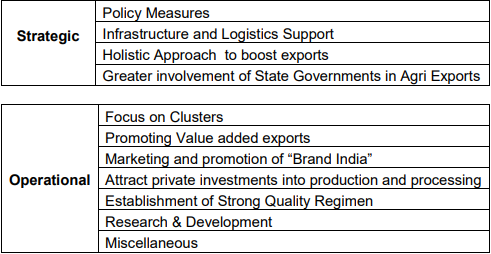Indian Economy
Agri Export Policy
- 01 Feb 2020
- 2 min read
Why in News
Recently, the Agricultural and Processed Food Products Export Development Authority (APEDA) along with State Government of Andhra Pradesh has dispatched the first shipment of high-quality bananas from Anantpur in Andhra Pradesh to Jawaharlal Nehru Port (JNPT) in Mumbai for exports to international markets.
- The long-distance affects the viability of export shipments due to high transport costs and quality losses. Hence, this time efforts were made for reducing the transit time by using refrigerated rail containers (freight transport that is refrigerated for the transportation of temperature-sensitive cargo).
Agri Export Policy
Keeping in mind the significant Indian agriculture holds, Government of India introduced Agri Export Policy in 2018.
- Objectives:
- Double Exports: To double agricultural exports from the present $30 billion to $60 billion by 2022 and reach $100 billion in the next few years thereafter, with a stable trade policy regime.
- Diversification: To diversify the export basket, and boost high value and value-added agricultural exports including focus on perishables.
- Non-Traditional Agri Products Promotion: To promote novel, indigenous, organic, ethnic, traditional and non-traditional Agri products exports.
- Market Access: To provide an institutional mechanism for pursuing market access, tackling barriers and deal with sanitary and phytosanitary issues.
- Global Integration: To strive to double India’s share in world agri-exports by integrating with global value chain at the earliest.
- Benefit Farmers: Enable farmers to get benefit of export opportunities in the overseas market.
- Vision: Harness export potential of Indian agriculture, through suitable policy instruments, to make India a global power in agriculture and raise farmers income.
- Elements:





